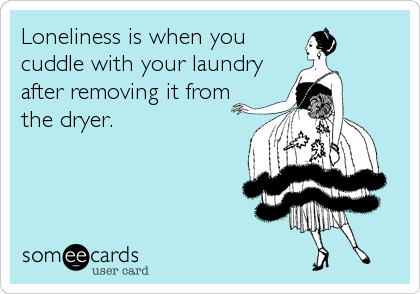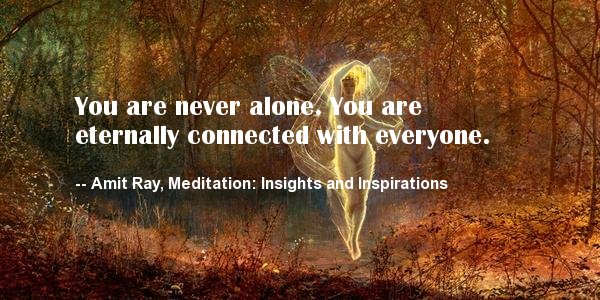
We’ve all felt lonely at certain points in our life. As social creatures who need the support and love of a community, we need to reach out to others and be open to receiving help from them. Not doing so can have a negative impact on our health and wellbeing. There are several ways we can feel connected with other people. Learn four things you can do to overcome feeling isolated and alone. (Estimated reading time: 6 minutes)
“Loneliness is not lack of company, loneliness is lack of purpose.”
— Guillermo Maldonado
At one time or another, everyone has felt lonely. You may have experienced it when you moved schools or workplaces, and struggled to make friends, or broken up with a partner and lost the friends you shared. You may even have an extensive social network, but don’t feel connected to anyone in it.
The irony of living in the most technologically connected age in history is that we have become increasingly disconnected from one another. The superficial connections developed on social media and in our fast-paced world abound with social climbers who focus on social collateral rather than on making meaningful connections. It can be hard to replicate the deeper and nourishing bonds we used to have in communal living.
We are social creatures who have evolved to thrive in collaborative and mutually beneficial networks of people. In tribal, and other collectivistic cultures, there exists an interdependence on shared resources and friendship. Most people living in the Western world who have succumbed to the ethos of individualism, have moved away from community.
David Brooks, author of The Second Mountain, considers loneliness a byproduct of hyper-individualism. “Hyper-individualism says ‘I belong to myself and no one else.’” Hyper-Individualism puts the same question on everybody’s lips: “What can I do to make myself happy?” Brook writes. “It gradually undermines any connection not based on individual choice—the connections to family, neighborhood, culture, nation, and the common good.”

To combat the epidemic of loneliness, Brooks founded the Weaver movement with the objective of “repairing our country’s social fabric” which he believes is badly frayed by distrust, division, and exclusion. The movement aims to shift from a culture of hyper-individualism that’s all about personal success, to relationalism that puts relationships at the center of our lives.
This is a much-needed model in countries with individualistic cultures, like the United States, where nearly half the population have reported feeling lonely according to a 2018 study. If so many people go through their daily routines experiencing loneliness, imagine how much worse they could feel when forced into a situation that isolates them from their familiar lifestyles. This is exactly what we are seeing now during the Coronavirus pandemic.
Over the past few weeks, efforts to stop the spread of COVID-19 have included a self-quarantine order and the closing of public and workspaces. Dani Fallin, a professor at the Department of Mental Health at Johns Hopkins, says that social isolation can cause a series of mental health illnesses like anxiety and depression. If left unmanaged, chronic loneliness can lead to other serious health issues like strokes, alcoholism and a compromised immune system.

Fallin says that in addition to coping with social isolation, people are having to deal with the influx of difficult news about the viral outbreak and cope with the anxiety that threat brings. To deal with this, he suggests recognizing that it’s normal to feel the way we do and seek out professional mental health resources, especially if the stress is acute.
In a time of crises, humans are instinctively driven to band together as a coping mechanism. What makes our current situation unique is that we have to face this crisis from the isolation of our homes.
That’s where the technology of today can work to our advantage. We can use virtual tools like Zoom and Skype to talk via audio and video so we can feel connected socially with family, friends, and colleagues. We can share our thoughts on active social media platforms.
Here are five other ways to overcome feeling isolated and alone:
1. Realize you’re never alone: Loneliness is a feeling and not a fact. Just like other limiting thoughts, the idea of ‘I am alone’ holds no truth. There are plenty of people out there, both strangers and loved ones, who can offer counsel or a safe space when you need it. If you’re feeling alone, schedule quality time with family or friends either in person or virtually. Don’t have anyone in your immediate circle? You can reach out to a number of online and in-person support groups, or attend events, like Meetup or Internations, where you can go as a single person and make new connections.
2. Spend time with people you feel connected to: Often when people say they’re lonely, what they’re really saying is that they don’t have anyone who understands them and can empathize with what they’re going through. It’s not the quantity of our connections that matter, but the quality. We need to surround ourselves with people who have a positive influence on us and who ‘get us’. These are the people whom you can call at 3am when you have an emergency. If you have such people in your life, make an effort to stay in touch.
3. Be open to receiving: Loners tend to wall themselves off from the rest of the world. The ones with an independent streak who think that they are crusaders, fighting the battle of life alone, shun the support and assistance offered by others. But vulnerability, and our interdependence on others, is what makes us human. The sooner that we accept this, the faster our burdens will be lifted from our shoulders. Tell yourself that it’s okay to be helped by others and be open to receiving their kindness. By letting your guard down, you allow others to express their altruism and compassion.
4. Learn to enjoy being in your company: Many people are uncomfortable with being seen alone in public. They’re concerned that others will see them as socially inept or a ‘loser’ with no friends. The truth is that the people who enjoy their own company are usually the ones with the most confidence and self-awareness. They have learned to experience bliss alone because they’re not scared of what they could find in the process of connecting with themselves.
Being solitary allows you to have a more intimate connection with life because you have the opportunity to process things on your own, without interruption. You’ll find that activities that we consider social, like watching a movie, walking in the park, or engaging in a creative hobby, can be just as enjoyable if you do them on your own.
5. Focus on gratitude and giving: An instant antidote to curing loneliness is learning to appreciate all the good things in your life. Little things like fresh, clean water or the roof above your head are things we often take for granted. Realizing how fortunate we are puts us in a different frame of mind and makes us appreciate what life has to offer.
This perspective also makes us more compassionate because we understand the plight of those who are suffering or are less fortunate. Shifting the focus from ourselves and onto those who need help takes us out of the darkness of an isolated and lonely existence.
The Indian guru Prabhat Ranjan Sarkar once said “You are never alone or helpless. The force that guides the stars guides you too.” When you feel alone, look up at the stars and take in the vast expanse of our Universe. The interconnectedness you see in the constellations mirrors the interconnectedness in human society. Like stars in a galaxy, we can all shine brighter when we can love and support one another.
All my best on your journey,
Seline

Question for you: Are you feeling isolated and alone during this period of self-isolation? What can you do to feel better?
Did you like this post? Sign up below, and I’ll send you more awesome posts like this every week.

Great, Nice read. But I would like to hear your thoughts rather than you quoting other people unless you want to make a point or so
Thank you for sharing this with us Seline. It is a time where many are feeling isolated and alone and very much powerless to really do much about it. We need to remember that it is a global issue and that we are not alone and that there are things we can do to overcome those overwhelming feelings of loneliness and isolation. Thanks for passing this gem on to the rest of us!